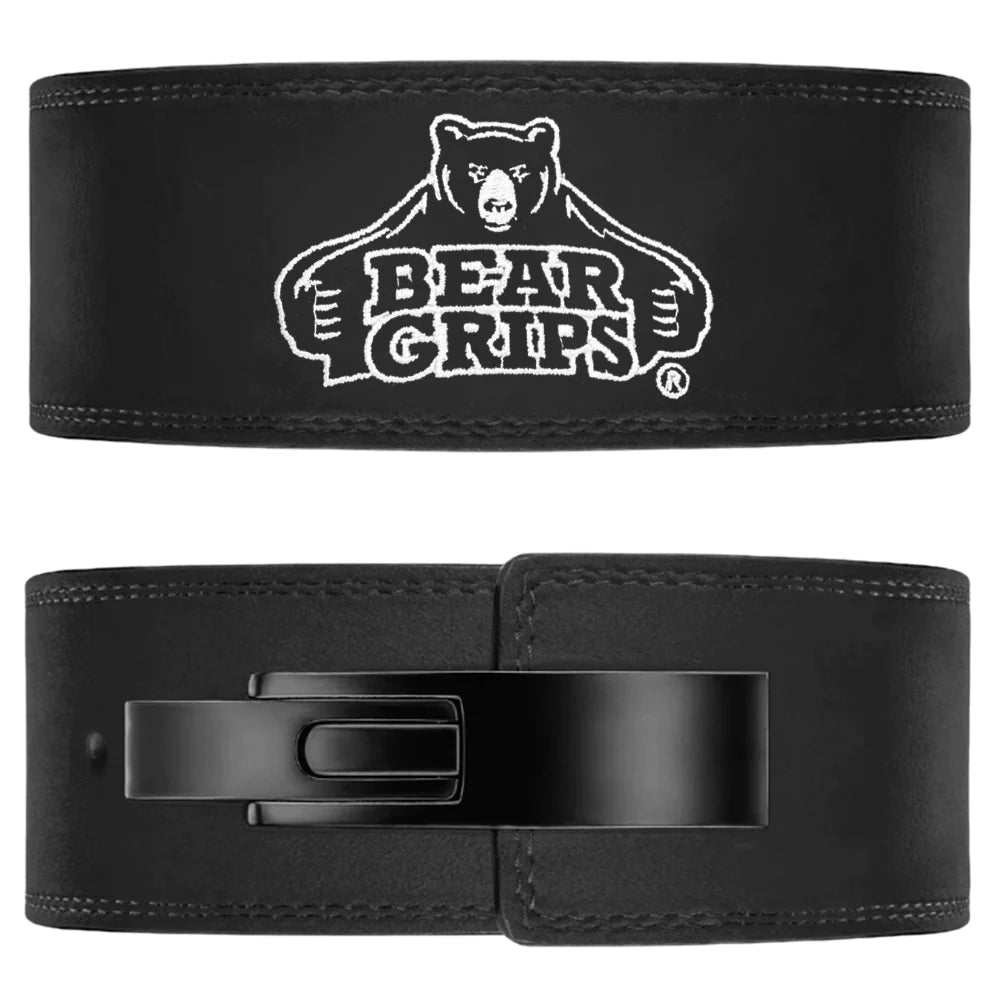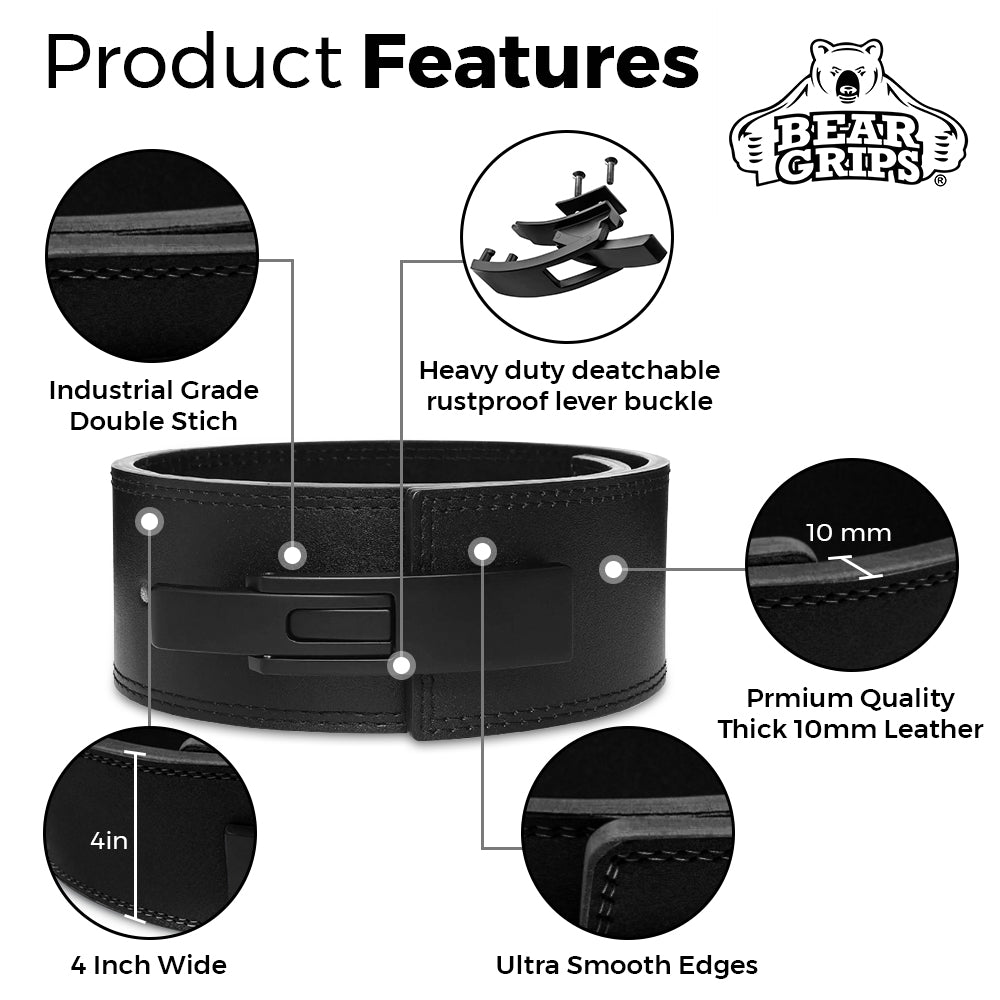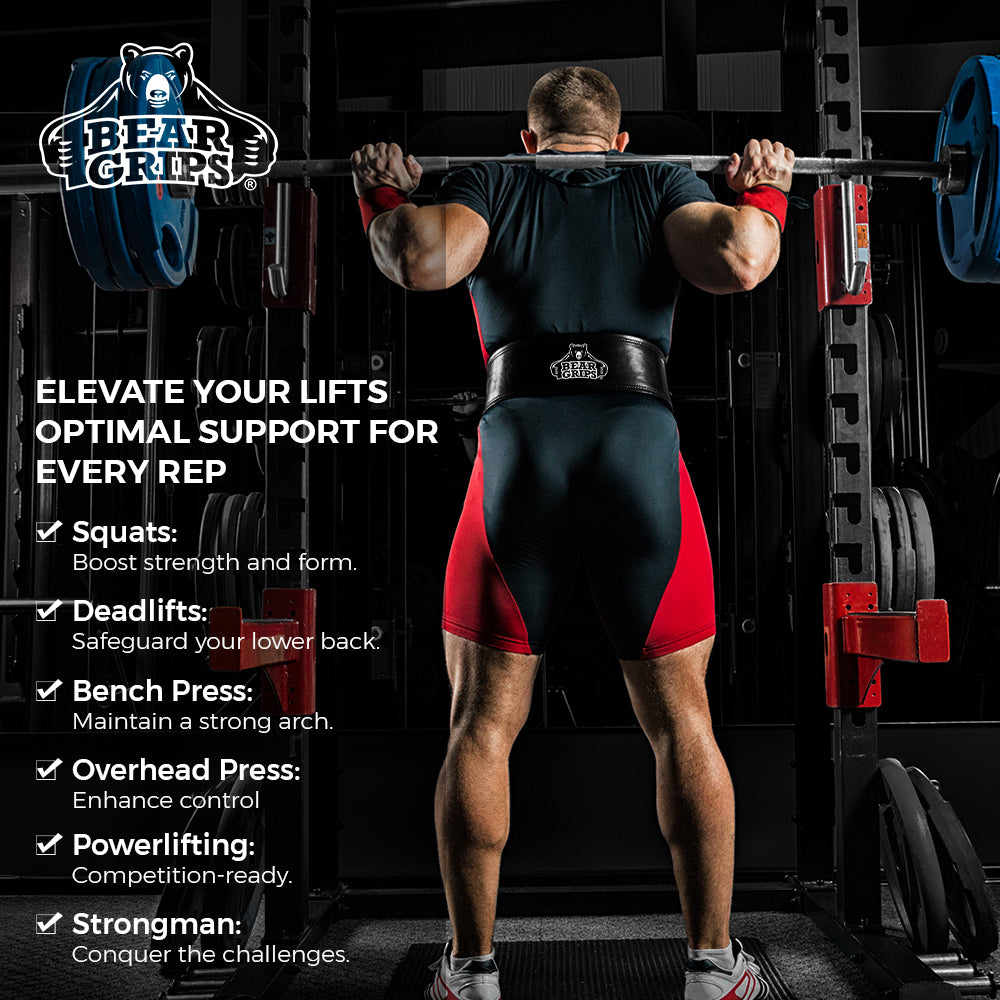
Powerlifting Lever Belts: Pros & Cons
Share
A powerlifting lever belt is a popular choice among advanced powerlifters looking to enhance their gym performance and safety during heavy lifts. This type of lifting belt offers a tighter fit and increased support compared to other styles, such as prong belts.
When considering the pros and cons of powerlifting lever belts, it's important to weigh factors like experience level, intended use, and budget before making a decision. While lever belts provide a secure fit and stability, they can be more expensive and require initial adjustment with a screwdriver.
- They are popular among advanced powerlifters but may not be suitable for beginners due to their higher cost and adjustment requirements.
- Consider factors such as experience level, intended use, and budget when deciding between lever belts and other options.
- Prong belts provide versatility and easy adjustability, while lever belts offer a more secure fit and stability.
- Try on different belts, consider quality and fit, and read reviews to find the best powerlifting belt for your needs.
What Is a Lever Belt?
A lever belt is a type of lifting belt that utilizes a lever system to fasten and secure it around the waist. It offers a secure and customized fit, similar to a lock and key mechanism. Lever belts are commonly used by intermediate and advanced lifters for exercises like squats and deadlifts. They provide a tighter fit compared to prong-style belts but require initial adjustment with a screwdriver to customize the fit. Lever belts are preferred by most competitive powerlifters due to their secure fit and stability.

Differences Between Lever vs Prong Belts
When it comes to powerlifting belts, two popular options are lever belts and prong belts. These belts have distinct differences in terms of cost, adjustability, versatility, and belt thickness.
Cost
Lever belts tend to be more expensive than prong belts due to the added mechanism and materials required for the lever system. While prong belts are often more budget-friendly, the price difference is worth considering when making a purchase.
Adjustability
Lever belts require initial adjustment with a screwdriver to achieve a proper fit. Once set, they offer a tighter fit and greater security during heavy lifts. On the other hand, prong belts offer easy adjustability without the need for additional tools. This makes prong belts more convenient for adjusting on the spot between sets and exercises.
Versatility
Prong belts are known for their versatility. They can be easily loosened or tightened to accommodate specific movements and personal preferences. This adjustability makes prong belts suitable for various exercises, making them a popular choice among lifters who perform a wide range of movements in their training routine.
Belt Thickness
Lever belts and prong belts also differ in terms of belt thickness. Lever belts typically come in two thickness options - 10mm and 13mm. The 10mm lever belts offer a slightly lighter and more flexible feel, while the 13mm lever belts provide additional support and stability. Prong belts, on the other hand, are commonly available in a standard thickness of 10mm.
| Comparison | Lever Belts | Prong Belts |
|---|---|---|
| Cost | Expensive | More affordable |
| Adjustability | Requires screwdriver | Easy adjustment |
| Versatility | Limited | Highly versatile |
| Belt Thickness | 10mm or 13mm | 10mm |
Ultimately, the choice between lever belts and prong belts depends on personal preferences, budget, and specific lifting needs. Lever belts offer a tight fit and enhanced security once adjusted, while prong belts provide convenience and versatility. Consider your priorities and training style to make an informed decision.
What to Consider Before Buying a Lever or Prong Belt
Before making a decision to purchase a lever or prong belt, there are several important factors to consider. Whether you are a beginner lifter or a first-time buyer, it is crucial to choose the right belt that suits your needs, budget, and specific movements.
For beginner lifters, prong belts are often a better choice. These belts offer adjustability, versatility, and cost-effectiveness, which are ideal for individuals who are just starting their fitness journey. Prong belts allow for easy tightening and loosening, making them suitable for various exercises and movements.

However, experienced lifters who primarily focus on squats and deadlifts may benefit more from a lever belt. Lever belts provide a secure fit and stability, giving advanced lifters the support they need during heavy lifts. The lever system ensures a tighter fit compared to prong belts, which can enhance overall performance in the gym.
Weight fluctuations are another important consideration. If you anticipate changes in weight throughout the year or require frequent adjustments, a prong belt may be a better option. Prong belts allow for quick and easy tightening or loosening, making it convenient for individuals who experience weight fluctuations.
Lastly, budget plays a significant role in the decision-making process. Lever belts tend to be more expensive than prong belts due to their advanced design and secure fit. It is essential to consider your budget and allocate funds accordingly to ensure you are making a worthwhile investment.
Before making a final decision, it is recommended to try on different belts and consider factors such as quality, fit, and customer reviews. By carefully considering these factors, you can make an informed decision and choose the belt that best suits your preferences and needs.
| Consideration | Prong Belt | Lever Belt |
|---|---|---|
| Adjustability | High | Low |
| Versatility | High | Low |
| Cost | Budget-friendly | Higher cost |
| Fit | Less secure | Tighter fit |
| Weight Fluctuations | Easier to adjust | Less convenient |

Conclusion
Deciding between lever belts and prong belts ultimately comes down to personal preference and specific needs. Lever belts offer a secure and tight fit, providing enhanced stability during heavy lifts. However, they can be more challenging to adjust and come with a higher price tag. On the other hand, prong belts offer versatility and easy adjustability, making them suitable for various movements. While they may not provide the same level of tightness as lever belts, they are often more budget-friendly.
When choosing the right belt, consider factors such as the type of movements you perform, experience level, budget, and potential size fluctuations. It is recommended to try on different belts to ensure a proper fit and consider the quality and durability of the materials. Reading customer reviews can also provide valuable insights into the performance and longevity of different belt options.
Whether you opt for a lever belt or a prong belt, both choices have their advantages and disadvantages. By carefully evaluating your specific needs and preferences, you can confidently select the belt that best suits your powerlifting journey. Remember, the right belt can significantly enhance your safety, performance, and overall lifting experience.
Looking for standard powerlifting lever belts? Check out Bear Grips today!
Shop at Amazon.com Now!
FAQ
What is a powerlifting lever belt?
A powerlifting lever belt is a type of lifting belt that utilizes a lever system to secure it around the waist, offering a tighter fit and enhanced support.
How does a lever belt differ from a prong belt?
Lever belts provide a tighter fit and more security once adjusted compared to prong belts. They require initial adjustment with a screwdriver, while prong belts offer easy adjustability without additional tools.
Which is better for beginners, a lever belt or a prong belt?
Prong belts are often recommended for beginners due to their adjustability, versatility, and cost-effectiveness.
Why do experienced lifters prefer lever belts?
Experienced lifters who focus on squats and deadlifts benefit from the secure fit and stability offered by lever belts.
What factors should I consider before buying a lever or prong belt?
Factors to consider include experience level, intended movements, weight fluctuations, and budget. Lever belts are more expensive but offer a tight fit, while prong belts are more versatile and easier to adjust.
How do I choose between lever and prong belts?
The choice between lever and prong belts depends on individual preferences and needs. Consider factors like movement type, experience level, budget, and size fluctuations to find the best option.


